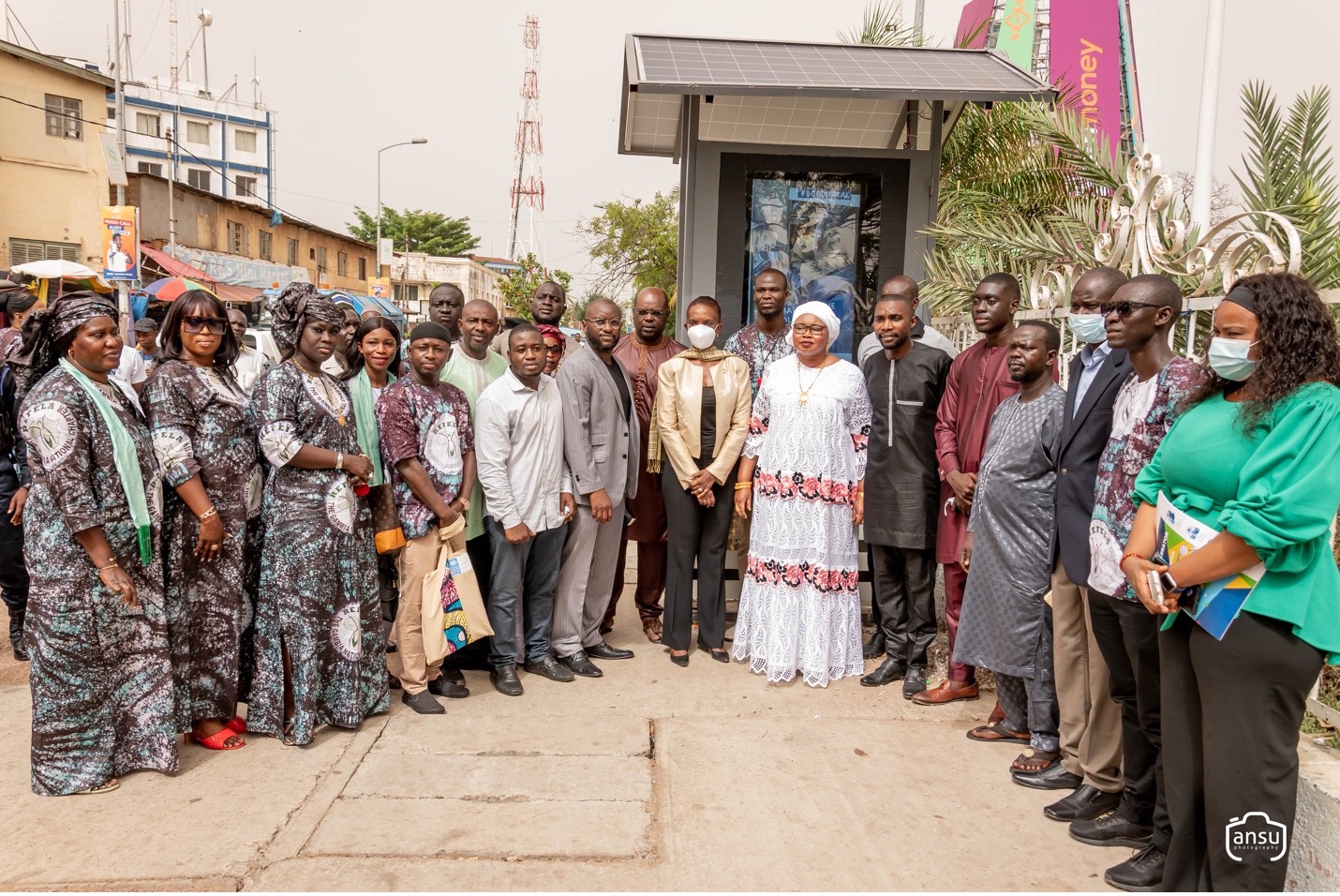Banjul City Council Leads the Way for Municipalities to go Digital
August 11, 2022

The UNDP Resident Representative and The Lord Mayor of Banjul and teams at one of the solar-powered smart digital kiosks
A few decades ago, smart cities sounded more like science fiction than reality. In an African context, arguments for its incompatibility might even garner more reaction than arguments in favor of the concept. However, in Banjul, the island capital city of The Gambia, a bold effort to pilot the concept took off this year and the results so far show promise.
In January 2020, UNDP The Gambia Accelerator Lab (AccLabGM) laid out the components for Banjul City Council (BCC), the capital city, to embrace a smart approach to the city’s administration. This involved the use of QR codes for vendor stall identification and registration; digitizing rate collection by market staff; and, using smart digital kiosks as information management systems. The firm identified to support implementation was locally sourced and shed a much-needed spotlight on the innovation capabilities of The Gambian tech ecosystem.
Our theory of change was simple – by introducing these interventions, we could increase efficiency in the council. Specifically, by using QR codes for stall management, we could reduce human error and issue marketspace, and manage market data better and faster. Secondly, with the rate collection system digitized, market rate collection could be done more transparently and quicker. Finally, with the information management system, market information could be more readily available, and communications could be made easier. An open-minded and forward-thinking council made the rollout of these interventions to be near effortless.
Once the UNDP The Gambia Country Office was selected for the Smart Cities Pilot initiative, as an implementing partner to work with the Singapore Center for Technology, Innovation, and Sustainable Development, AccLabGM quickly regrouped to commit resources to the project and get an early start. Researchers from the University of The Gambia collected data on the market organs and surveyed BCC staff for the project. Once this process was completed and our partnerships with the council formalized, a detailed scope of work was drawn up, allowing us to recruit a very suitable local implementing partner firm.
Naturally, implementation did not come without challenges. The COVID-19 Pandemic posed risks to the implementation timeline with lethargic Global Supply Chain operations. Good foresight from our partner firm, however, allowed us to effectively mitigate these risks through early procurement. Secondly, the absorptive capacity of the councils for the digital technology used was also marked as a possible area of concern. However, with a sense of well-planned hands-on training for both the Council staff and market management team, the rollout was encouraging and facilitated a smooth handover at the end of the pilot. Finally, in managing the issue of power supply to the kiosks in a country still confronting wide-reaching power supply issues, we tapped into solar technologies to power the devices.
In June 2022, Aissata De, the UNDP Resident Representative of The Gambia, was joined by the Lord Major of Banjul, Rohey Malick Lowe, for the launching of the Smart Cities Pilot project. Local media were invited to the event, which was hosted at the heart of the oldest market in Banjul, Albert Market. As a signal of the handover at that point, UNDP gifted the Mayoress a 3D printed map of Banjul – perhaps a colorful reminder of what else the city can do to expand its efforts on digitalization.

Handover of the 3D printed Map of Banjul by the UNDP RR to the Lord Mayor of Banjul
So far, the results have been satisfactory. Rate collection has increased by 25% and three of the five market zones where the pilot was introduced, have all been migrated to the new registration system. The digital kiosks also show promise with the council currently planning a campaign to promote advertisement space for hire. There are wider implications for this work beyond the 3 key areas of intervention and AccLabGM remains open to exploring them.

A rate collector processes a vendor’s payment by scanning their QR code.
In the meantime, we are determined to scale out some aspects of the project to other councils within the region that is the Greater Banjul Areas, with an outlook to helping make The Gambia more ‘Smart.’ The creation of a new Ministry for Digital Economy and Communications is a welcome move by the government. Like many, we are optimistic about the prospects for digital transformation in The Gambia. Banjul has already embraced #FutureSmart, and we urge you and your city to do the same.
It might be just the ‘smart’ thing to do!

 Locations
Locations